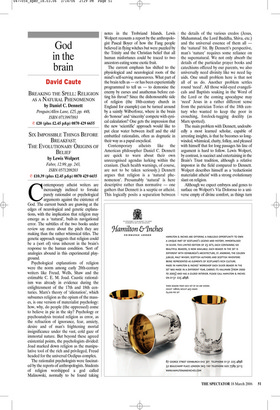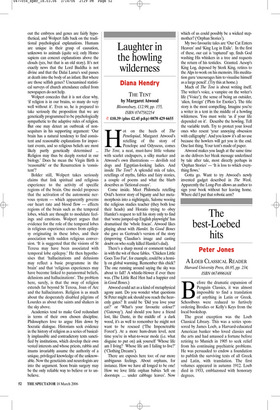God in the brain
David Caute
BREAKING THE SPELL: RELIGION AS A NATURAL PHENOMENON by Daniel C. Dennett Penguin/Allen Lane, £25, pp. 448, ISBN 0713997893 ✆ £20 (plus £2.45 p&p) 0870 429 6655 SIX IMPOSSIBLE THINGS BEFORE BREAKFAST: THE EVOLUTIONARY ORIGINS OF BELIEF by Lewis Wolpert Faber, 12.99, pp. 243, ISBN 0571209203 ✆ £10.39 (plus £2.45 p&p) 0870 429 6655 Contemporary atheist writers are increasingly inclined to forsake purely rationalist or psychological arguments against the existence of God. The current bunch are gnawing at the edges of neurological and genetic explanations, with the implication that religion may emerge as a ‘natural’, built-in navigational error. The subtitles of the two books under review say more about the pitch they are making than the rather whimsical titles. The genetic approach suggests that religion could be a (sort of) virus inherent in the brain’s response to the human condition. ‘Sort of’ analogies abound in this experimental playground.
Psychological explanations of religion were the norm among early 20th-century writers like Freud, Wells, Shaw and the estimable C. E. M. Joad. Caustic rationalism was already in evidence during the enlightenment of the 17th and 18th centuries. Marx’s theory of ‘alienation’, which subsumes religion as the opium of the masses, is one version of materialist psychology: how, why, do people (the oppressed) come to believe in pie in the sky? Psychology or psychoanalysis treated religion as error, as the refraction of ignorance, fear, anxiety, desire and of man’s frightening mortal insignificance under the vast, cold gaze of immortal nature. But beyond these agreed existential points, the psychologists divided: Joad marked down religion as the manipulative tool of the rich and privileged, Freud headed for the universal Oedipus complex.
The rationalist psychologists were fascinated by the reports of anthropologists. Students of religion worshipped a god called Malinowski, normally to be found taking notes in the Trobriand Islands. Lewis Wolpert recounts a report by the anthropologist Pascal Boyer of how the Fang people believed in flying witches but were puzzled by the Trinity and the Christian belief that all human misfortunes could be traced to two ancestors eating some exotic fruit.
The current emphasis has shifted to the physiological and neurological roots of the mind’s self-serving manoeuvres. What part of the brain tells us — or has been experientially programmed to tell us — to demonise the enemy by curses and anathemas before cutting his throat? Since the dishonourable side of religion (the 18th-century church in England for example) can be turned around by a saintly Wilberforce, where in the brain do ‘honour’ and ‘sincerity’ compete with cynical calculation? One gets the impression that the new ‘scientific’ approach would like to put clear water between itself and the old embattled rationalists, often as dogmatic in their way as a papal encyclical.
Contemporary atheists like the American philosopher Daniel C. Dennett are quick to warn about their own unrecognised agendas lurking within the cranium. (Such health warnings, of course, are not to be taken seriously.) Dennett argues that religion is a ‘natural phenomenon’. Presumably ‘natural’ is here descriptive rather than normative — one gathers that Dennett is a sceptic or atheist. This logically posits a separation between the details of the various credos (Jesus, Muhammad, the Lord Buddha, Shiva, etc.) and the universal essence of them all the ‘natural’ bit. By Dennett’s perspective, man’s ‘nature’ requires some reliance on the supernatural. We not only absorb the details of the particular prayer books and catechisms offered by our parents, we also universally need divinity like we need liquids. One small problem here is that not all of us do. Another problem settles round ‘need’. All those wild-eyed evangelicals and Baptists soaking in the Word of the Lord or the coming apocalypse may ‘need’ Jesus in a rather different sense from the patrician Tories of the 18th century who wanted to keep the poor in crouching, forelock-tugging docility (as Marx spotted).
The main problem with Dennett, undoubtedly a most learned scholar, capable of arresting insights, is that he becomes so longwinded, whimsical, chatty, folksy, and pleased with himself that for long passages his line of argument is hard to follow. Lewis Wolpert, by contrast, is succinct and entertaining in the Brain’s Trust tradition, although a relative impostor in the field compared to Dennett. Wolpert describes himself as a ‘reductionist materialist atheist’ with a strong evolutionary slant on religion.
Although we expect embryos and genes to surface on Wolpert’s Via Dolorosa to a universe empty of divine comfort, as things turn out the embryos and genes are fairly hypothetical, and Wolpert falls back on the traditional psychological explanations. Humans are unique in their grasp of causation, unknown to animals (quite so); only Homo sapiens can concoct explanations above the clouds (yes, but that is an old story). It’s not exactly news that the Lord Buddha is not divine and that the Dalai Lama’s soul passes at death into the body of an infant. But where are those selfish genes? Unexamined statistical surveys of church attendance culled from newspapers do not help.
Wolpert concedes that it is not clear why, ‘if religion is in our brains, so many do very well without it’. Even so, he is prepared to take seriously the proposition that we are genetically programmed to be psychologically sympathetic to the adaptive rules of religion. But one may detect an outbreak of nonsequiturs in his supporting argument: ‘Our brain has a natural tendency to find consistent and reasonable explanations for important events, and so religious beliefs are most likely partly genetically determined ... Religion may thus be deeply rooted in our biology.’ Does he mean the Virgin Birth is ‘reasonable’ or the Resurrection is ‘consistent’?
Bolder still, Wolpert takes seriously claims that link spiritual and religious experience to the activity of specific regions of the brain. One model proposes that the activation of the autonomic nervous system — which apparently governs our heart rate and blood flow — effects regions of the brain such as the temporal lobes, which are thought to modulate feelings and emotions. Wolpert argues that evidence for the role of the temporal lobes in religious experience comes from epilepsy originating in these lobes, and their association with sudden religious conversion. ‘It is suggested that the visions of St Teresa may have been associated with temporal lobe epilepsy.’ He then hypothesises that ‘hallucinations and delusions may reflect a basic programme in the brain’ and that ‘religious experiences may have become linked to paranormal beliefs, delusions and hallucinations’. The problem here, surely, is that the sway of religion extends far beyond St Teresa, Joan of Arc and the hallucinators. Religion is as much about the desperately disabled pilgrims of Lourdes as about the saints and shakers in the sky above.
Academics tend to make God redundant in terms of their own chosen discipline. Philosophers love to argue Him down by Socratic dialogue. Historians seek evidence in the history of religion as a series of basically implausible and contradictory texts sanctified by institutions, which develop their own vested interests and whose priests, rabbis and imams invariably assume the authority of a unique, privileged knowledge of the unknowable. Now the geneticists and neurologists are into the argument. Soon brain surgery may be the only reliable way to believe or to unbelieve.



















































































 Previous page
Previous page